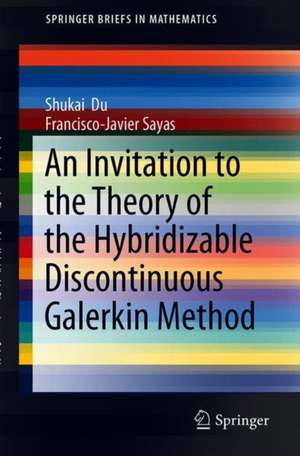An Invitation to the Theory of the Hybridizable Discontinuous Galerkin Method: Projections, Estimates, Tools: SpringerBriefs in Mathematics
Autor Shukai Du, Francisco-Javier Sayasen Limba Engleză Paperback – 14 sep 2019
This monograph requires basic knowledge of the variational theory of elliptic PDE and the techniques used for the analysis of the Finite Element Method. However, all the tools for the analysis of FEM (scaling arguments, finite dimensional estimates in the reference configuration, Piola transforms) are carefully introduced before being used, so that the reader does not need to go over longforgotten textbooks. Readers include: computational mathematicians, numerical analysts, engineers and scientists interested in new and computationally competitive Discontinuous Galerkin methods. The intended audience includes graduate students in computational mathematics, physics, and engineering, since the prerequisites are quite basic for a second year graduate student who has already taken a non necessarily advanced class in the Finite Element method.
Din seria SpringerBriefs in Mathematics
-
 Preț: 378.46 lei
Preț: 378.46 lei -
 Preț: 380.84 lei
Preț: 380.84 lei -
 Preț: 380.29 lei
Preț: 380.29 lei -
 Preț: 383.93 lei
Preț: 383.93 lei -
 Preț: 350.11 lei
Preț: 350.11 lei -
 Preț: 352.28 lei
Preț: 352.28 lei -
 Preț: 351.57 lei
Preț: 351.57 lei -
 Preț: 378.92 lei
Preț: 378.92 lei -
 Preț: 341.60 lei
Preț: 341.60 lei -
 Preț: 452.06 lei
Preț: 452.06 lei -
 Preț: 379.48 lei
Preț: 379.48 lei -
 Preț: 446.65 lei
Preț: 446.65 lei -
 Preț: 351.57 lei
Preț: 351.57 lei - 15%
 Preț: 463.68 lei
Preț: 463.68 lei -
 Preț: 377.95 lei
Preț: 377.95 lei -
 Preț: 378.12 lei
Preț: 378.12 lei -
 Preț: 352.28 lei
Preț: 352.28 lei -
 Preț: 379.68 lei
Preț: 379.68 lei -
 Preț: 376.80 lei
Preț: 376.80 lei -
 Preț: 351.90 lei
Preț: 351.90 lei -
 Preț: 380.07 lei
Preț: 380.07 lei -
 Preț: 352.28 lei
Preț: 352.28 lei -
 Preț: 350.81 lei
Preț: 350.81 lei -
 Preț: 343.72 lei
Preț: 343.72 lei -
 Preț: 349.41 lei
Preț: 349.41 lei - 15%
 Preț: 464.18 lei
Preț: 464.18 lei -
 Preț: 351.90 lei
Preț: 351.90 lei - 15%
 Preț: 464.32 lei
Preț: 464.32 lei -
 Preț: 381.00 lei
Preț: 381.00 lei -
 Preț: 344.47 lei
Preț: 344.47 lei - 15%
 Preț: 462.19 lei
Preț: 462.19 lei -
 Preț: 377.18 lei
Preț: 377.18 lei -
 Preț: 378.34 lei
Preț: 378.34 lei -
 Preț: 345.45 lei
Preț: 345.45 lei -
 Preț: 355.76 lei
Preț: 355.76 lei - 20%
 Preț: 352.85 lei
Preț: 352.85 lei -
 Preț: 453.15 lei
Preț: 453.15 lei -
 Preț: 380.45 lei
Preț: 380.45 lei -
 Preț: 377.95 lei
Preț: 377.95 lei -
 Preț: 343.00 lei
Preț: 343.00 lei -
 Preț: 562.34 lei
Preț: 562.34 lei - 15%
 Preț: 461.73 lei
Preț: 461.73 lei -
 Preț: 379.68 lei
Preț: 379.68 lei -
 Preț: 379.68 lei
Preț: 379.68 lei -
 Preț: 411.36 lei
Preț: 411.36 lei -
 Preț: 343.72 lei
Preț: 343.72 lei -
 Preț: 350.11 lei
Preț: 350.11 lei -
 Preț: 448.21 lei
Preț: 448.21 lei -
 Preț: 378.92 lei
Preț: 378.92 lei -
 Preț: 344.86 lei
Preț: 344.86 lei
Preț: 418.60 lei
Nou
Puncte Express: 628
Preț estimativ în valută:
80.10€ • 83.84$ • 66.67£
80.10€ • 83.84$ • 66.67£
Carte tipărită la comandă
Livrare economică 26 martie-01 aprilie
Preluare comenzi: 021 569.72.76
Specificații
ISBN-13: 9783030272296
ISBN-10: 303027229X
Pagini: 124
Ilustrații: X, 124 p. 24 illus.
Dimensiuni: 155 x 235 mm
Greutate: 0.2 kg
Ediția:1st ed. 2019
Editura: Springer International Publishing
Colecția Springer
Seria SpringerBriefs in Mathematics
Locul publicării:Cham, Switzerland
ISBN-10: 303027229X
Pagini: 124
Ilustrații: X, 124 p. 24 illus.
Dimensiuni: 155 x 235 mm
Greutate: 0.2 kg
Ediția:1st ed. 2019
Editura: Springer International Publishing
Colecția Springer
Seria SpringerBriefs in Mathematics
Locul publicării:Cham, Switzerland
Cuprins
Getting ready.- Projection analysis of mixed methods.- The Hybridizable Discontinuous Galerkin method.- Variants of the HDG method.- HDG methods for evolutionary equations.- Further reading.
Caracteristici
First introduction to a systematic analysis of the Hybridizable Discontinuous Galerkin Method Presentation of new simplified techniques to prove estimates using the well-established projection-based analysis of HDG methods Covers applications to diffusion process (steady-state and evolutionary) and wave propagation (time-harmonic and transient)
